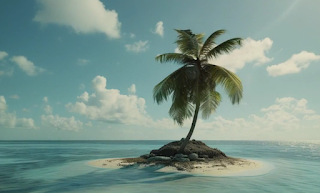The Problem of Theft
Imagine we find ourselves on a desert island. Everyone's free to live how they want. It's "Live and Let Live." Other than that there are no rules. However, one guy doesn't respect that, and goes around beating people up - imposing his will upon others. Suddenly, our peaceful freedom is disrupted, and we need the rule of law. Our group of once anarchists now need to band together, to defend the peace and freedom they hoped would be automatic.
It's a moral dilemma. They believe using force against another human being is wrong, but this guy - this particular human - has already been using force against others. So, it's reluctantly decided: Thou shalt not murder; thou shalt not steal ..thou shalt not go around beating people up.
Or, rather, the island tribe can now use force against a person, but only if that person has already used force against someone else, and abused the "Live and Let Live" ethos. It's basic common law. The law is there to protect your freedom from those that infringe it, and no more.
Coconuts
Now let's imagine another situation. You woke up nice and early. You spent the morning climbing coconut trees. You now have 10 coconuts. However, another guy on the island, he slept-in. He missed the coconut harvest, and now he doesn't have any.
If you were a nice guy you'd give him some of your coconuts, but you say, "No". You sweated in the morning sun, as he slept lazily on the beach. He'll have to miss the piña colada.
The rest of the group aren't too happy with this lurch away from island communism though. So, they create a new law. One that says you'll have to give away half of your capitalist coconuts ..and that if you don't abide, you'll be forcibly put in the island jail, alongside the guy that went around beating people up.
Now the law has taken a different turn. Once, it was there solely to protect the individual from infringement. Now it's being used to infringe an individual - even though that individual hasn't infringed anyone else.
"I only got out of bed and climbed a coconut tree," you think. "Plus, whatever happened to 'Thou Shalt Not Steal'?"
The Problem With Theft
This brings us to another quandary. 'Thou Shalt Not Steal' sits quite naturally alongside 'Thou Shalt Not Murder' when we think of basic prohibitions. However, it works on the assumption that our property is an extension of our person.
Obviously, our bodies belong to ourselves. So if someone overrides our bodily autonomy, it's usually pretty easy to discern who is in the wrong. With property it isn't always as obvious though. Who decides who owns an item, or a parcel of land, or an idea?
We intuitively have a sense that some things "belong" to people, and we likewise intuitively understand that it's wrong to steal from others, but the lines aren't always clear in reality. Were the coconuts yours? Or were they the collective property of the island? Does someone perhaps even claim ownership over the entire island? And what would such a claim rest upon? Is it purely precedent? Like bagsying the window seat on a bus?
When someone holds something in their hand, and another person snatches it from them, we clearly perceive the person who originally held the item to be the victim. When things are more abstract, or wider contexts are taken into consideration, things get messier though.
This is another one of those things in life where there isn't always a clear right and wrong answer. Having a clear view of the problem though can at least help us make more balanced decisions when any issues present themselves.




Comments
Post a Comment